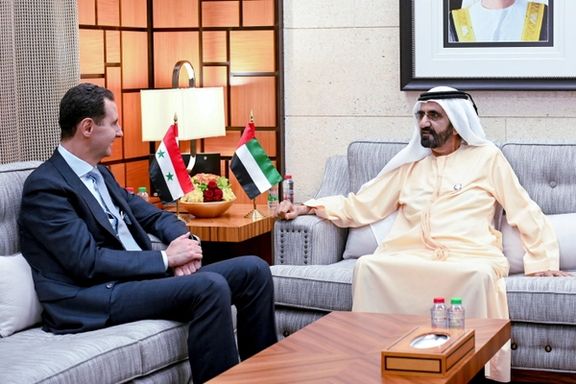To Washington's Dismay, UAE Hosts Assad

Washington has sharply rebuked Abu Dhabi for hosting Syrian President Bashar al-Assad on Friday, saying his visit was an apparent attempt to legitimize him.

Washington has sharply rebuked Abu Dhabi for hosting Syrian President Bashar al-Assad on Friday, saying his visit was an apparent attempt to legitimize him.
The unexpected one-day visit was Assad’s first to any Arab country since Syria’s civil war started in 2011 when his opponents began protests against the authoritarian rule of the family.
The United Arab Emirates once backed rebels fighting Assad’s forces, but in recent months there have been signs of warming relations, showing that the Persian Gulf US ally is pursuing a very different policy from that of Washington.
The State Department said on Friday it was "profoundly disappointed and troubled" by what it called an apparent attempt to legitimize Assad.
The timing of the trip coincided with the eleventh anniversary of the Syrian uprising, at a time when Washington has been working worldwide to unite allies and partners against Russia's invasion of Ukraine. Assad is a close ally of Moscow, which intervened in Syria’s civil war in 2015 with air power in coordination with Iran that supplied ground troops to crush the rebels.
State Department spokesperson Ned Price reiterated that Washington remains opposed to efforts to normalize ties or rehabilitate Assad. He said the United States will not waive or lift sanctions on Syria unless progress is made toward a political solution to the conflict, which has killed hundreds of thousands of people since spiraling out of an uprising against Assad.
"We urge states considering engagement with the Assad regime to weigh carefully the horrific atrocities visited by the regime on the Syrians over the last decade, as well as the regime's continuing efforts to deny much of the country access to humanitarian aid and security," Price said in an email, Reuters reported.
Washington had expressed concern in November when the UAE foreign minister visited Damascus and met Assad.
But the Biden administration has eroded its political capital with both Riyadh and Abu Dhabi by not heeding their concerns about regional rival Iran, ending its support for their war in Yemen and slapping conditions on US weapons sales to the Gulf states.
Although Abu Dhabi has not commented much about US negotiations with Iran to restore the 2015 nuclear agreement known as JCPOA, but it has been very clear that both Saudi Arabia and the UAE regard the deal as inadequate to contain Iran’s missile and proxy threats in the region.
The UAE has also established closer ties with Israel since the landmark establishment of diplomatic relation in 2020. It is believed that the two countries share intelligence and cooperate against what they see as Iranian threats.
The UAE has also stayed neutral in the Ukraine crisis, saying a peaceful resolution is more important than taking sides, reflecting its close ties with Moscow. While it voted for a United Nations General Assembly resolution against Russia’s invasion, it abstained in a similar vote at the Security Council, which carried more weight.
In addition for a desire to protect its security amid misgivings about the Biden administration, the UAE also cares about its cooperation with Russia in the OPEC+ arrangement, where oil supplies have been controlled by major producers to avoid a sharp fall that occurred in 2014.
UAE Foreign Minister Sheikh Abdullah bin Zayed Al Nahyan who visited Moscow on Thursday said his government is keen to cooperate with Moscow on improving energy security.
To show their displeasure with Washington both Riyadh and Abu Dhabi have resisted boosting supplies after the Russian invasion, but they have to walk a line between the West and Russia.